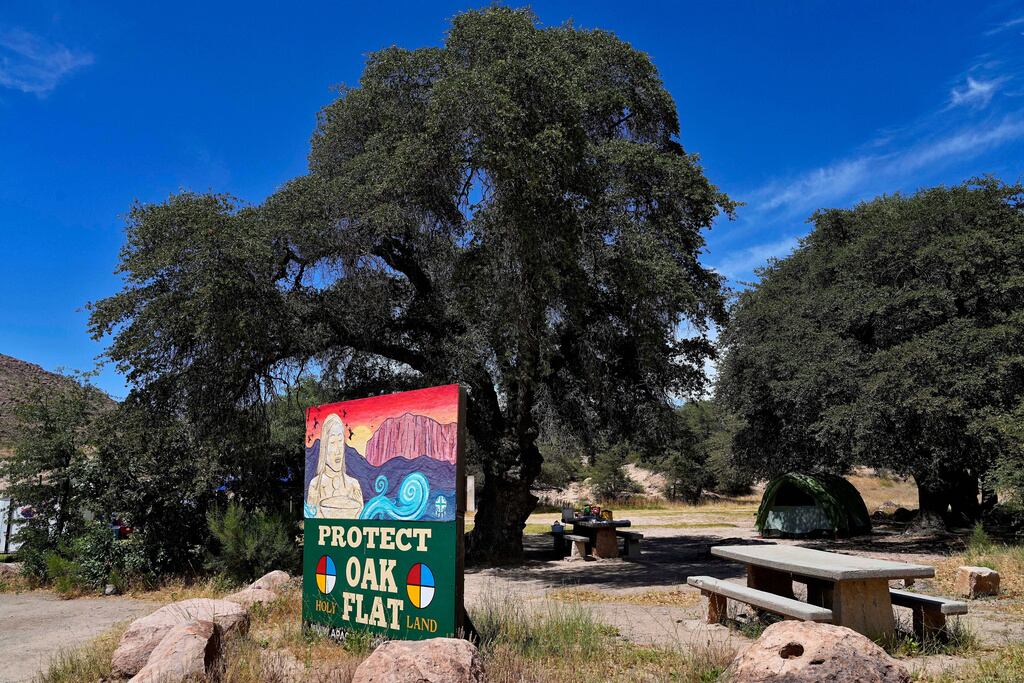The transfer of federal forest land in Arizona to two foreign corporations interested in mining one of the biggest copper reserves in North America has been temporarily halted by a U.S. appeals court.
Tuesday was the planned date of the transfer. However, in response to last-minute petitions by environmentalists and a Native American tribe, a panel of justices from the 9th U.S. District Court of petitions imposed a temporary injunction late Monday.
The territory includes Oak Flat, which has been used for generations by the San Carlos Apache and other Native American tribes for religious ceremonies, prayer, and the collection of medicinal herbs.
A mandated environmental evaluation released earlier this summer by the U.S. Forest Service and an appraisal of the area to be mined by Resolution Copper approximately 60 miles (96 kilometers) east of Phoenix are at the heart of the most recent legal battle in the two-decade-old conflict over Oak Flat.
The plaintiffs contended that the federal government must draft an extensive evaluation that addresses every facet of the proposed mining and all associated infrastructure prior to the land exchange taking place. According to them, the administration neglected to take into account the possibility of a dam breach, pipeline failure, and whether an emergency plan for a tailings storage location existed.
Additionally, they stated that the appraisal does not take into consideration the value of copper resources located at least 5,000 feet (1,500 meters) below the surface.
Later this year, the appeals court will hear arguments on the case’s merits.
The court case is seen as a triumph by the mine’s opponents, who claim that their prayers are being answered.
In a message posted on social media, Wendsler Nosie Sr. of the group Apache Stronghold stated that this injunction comes during a time when people nationwide and internationally are pleading for miracles.
The land and water at Oak Flat are valuable, according to Nosie, a former tribal chairman.
The San Carlos Apache Tribe, Apache Stronghold, and other plaintiffs have been litigating for years to protect what the tribe refers to as Chi Chil Bildagoteel. There are oak woods and other customary flora around the area that the Apaches believe are important to their faith.
In a statement, Tribal Chairman Terry Rambler said, “We will keep praying that the court recognizes the serious injustice of selling our sacred grounds to foreign mining companies that want to destroy Ch chil Bi dagoteel in order to extract copper that will be exported overseas.”
According to Resolution Copper, a division of global mining behemoths Rio Tinto and BHP, the project is expected to boost Arizona’s economy by $1 billion annually and create thousands of employment. The surrounding village of Superior supports the proposal.
According to Resolution Copper, the U.S. Forest Service conducted a thorough evaluation of the project and consulted with tribes who have ancestors who have a connection to the area.
According to the firm, significant modifications to the mining plan have been made as a direct result of the collaborative process in order to protect and lessen any possible effects on tribal, social, environmental, and cultural interests.
In court documents, the Forest Service has contended that it lacks discretion because Congress required the land exchange when it included language in a national defense spending measure that then-President Barack Obama signed into law in 2014.
Since then, there have been fruitless legislative attempts to stop mining in the Oak Flat region.






